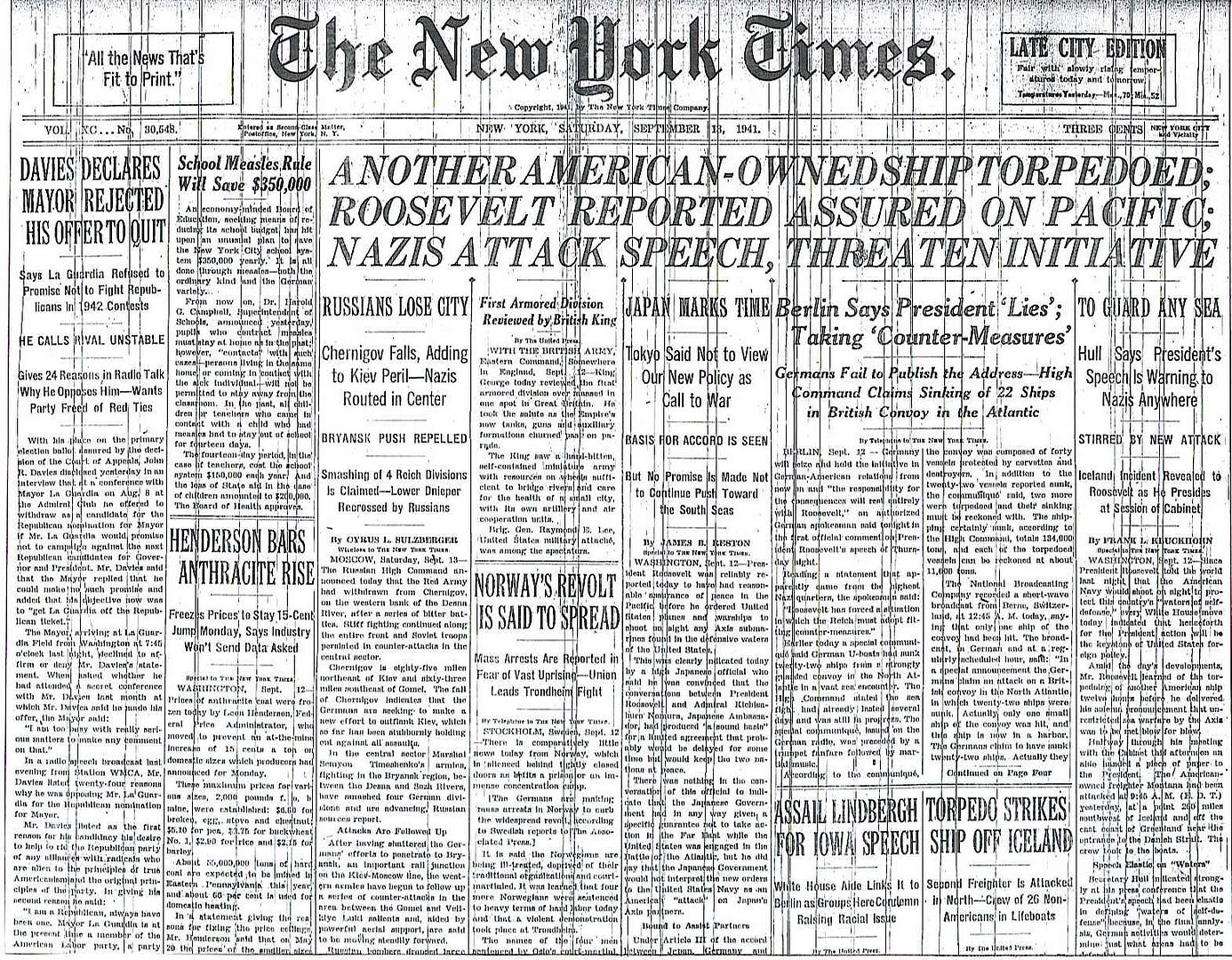
Posted on 09/13/2011 4:44:34 AM PDT by Homer_J_Simpson

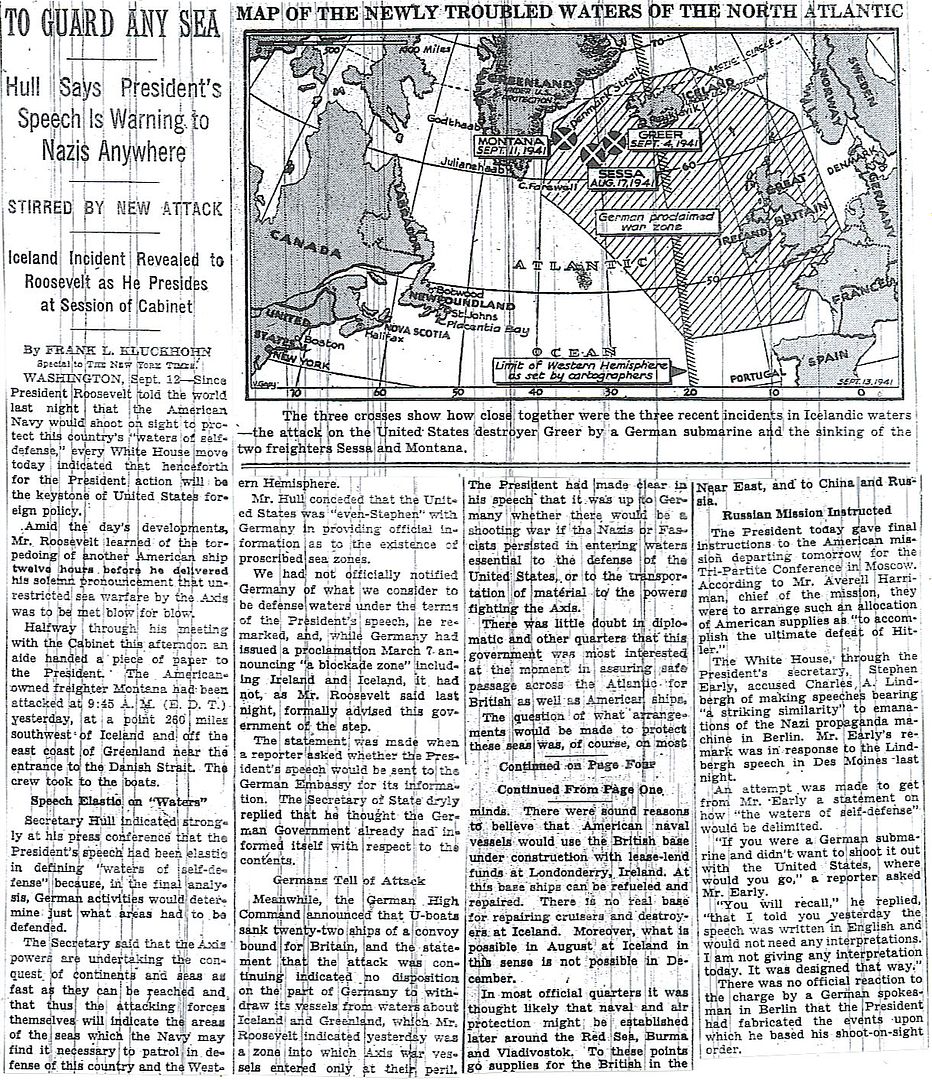
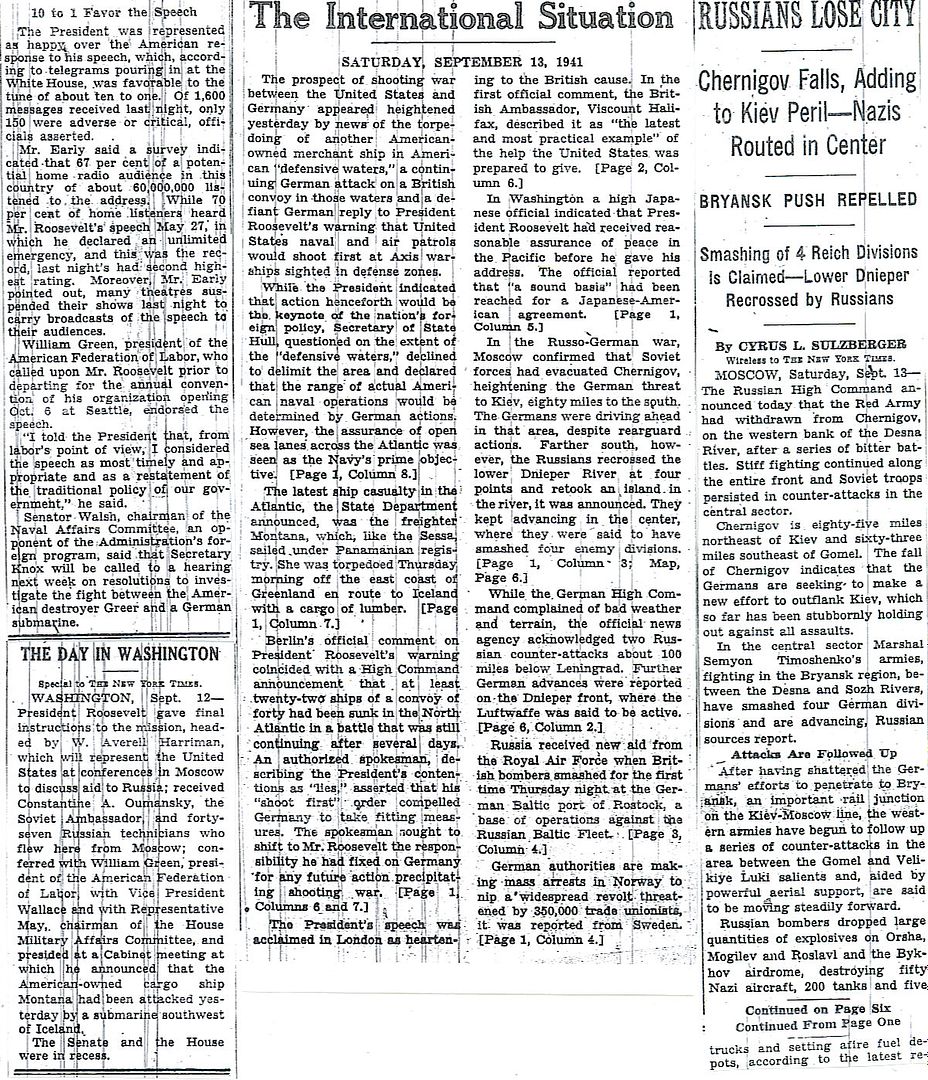
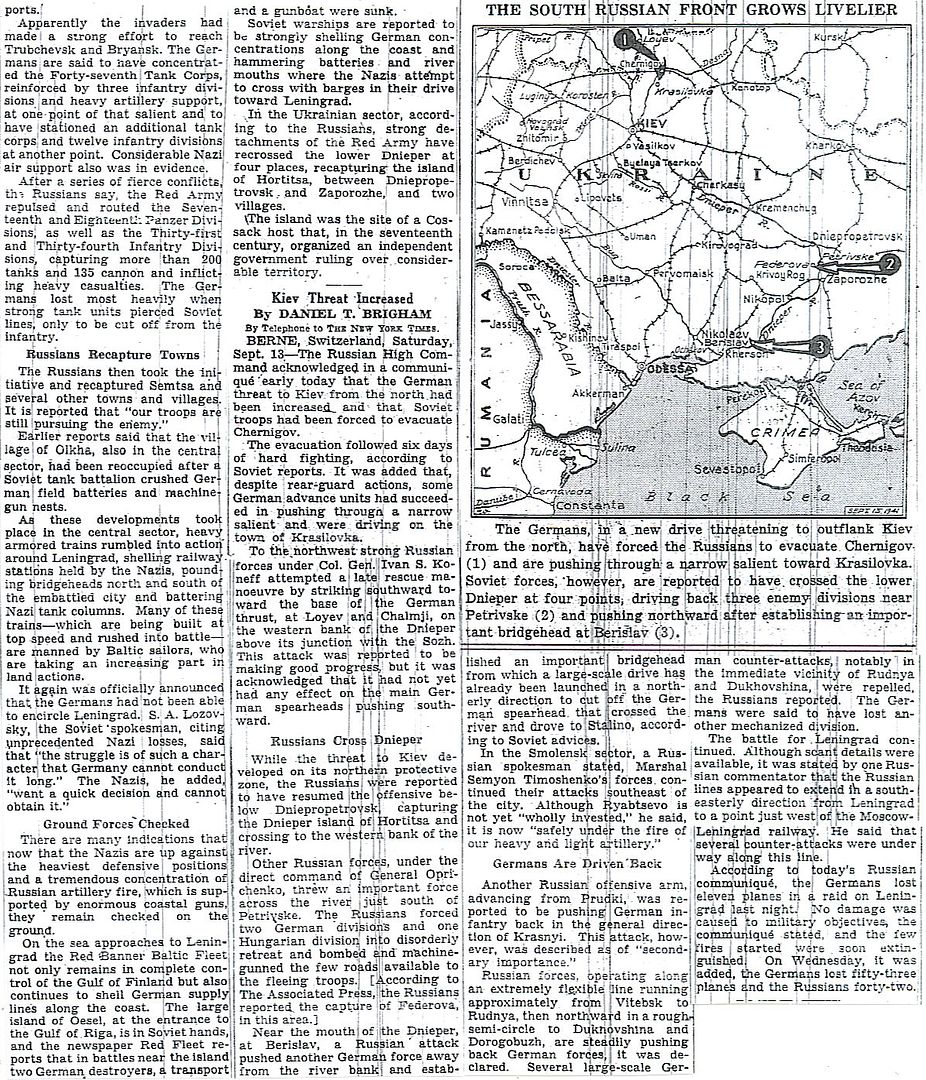
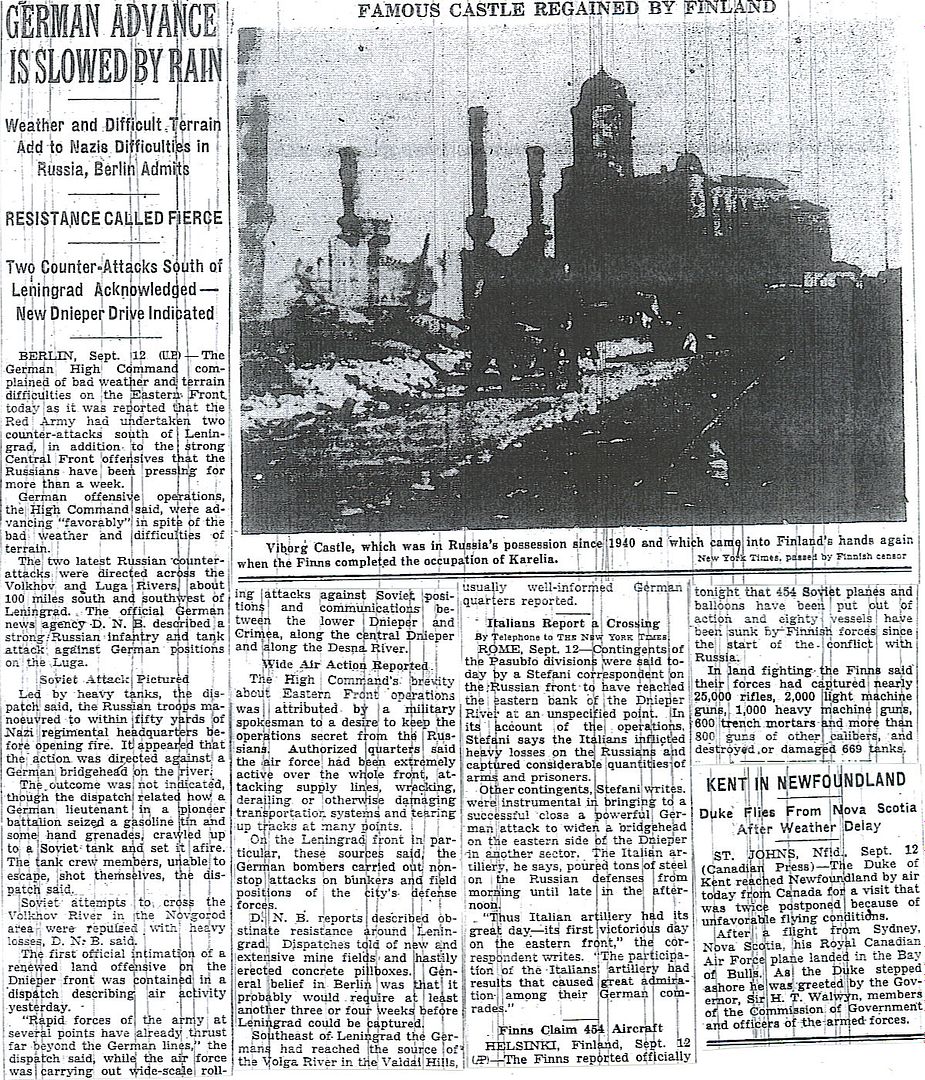
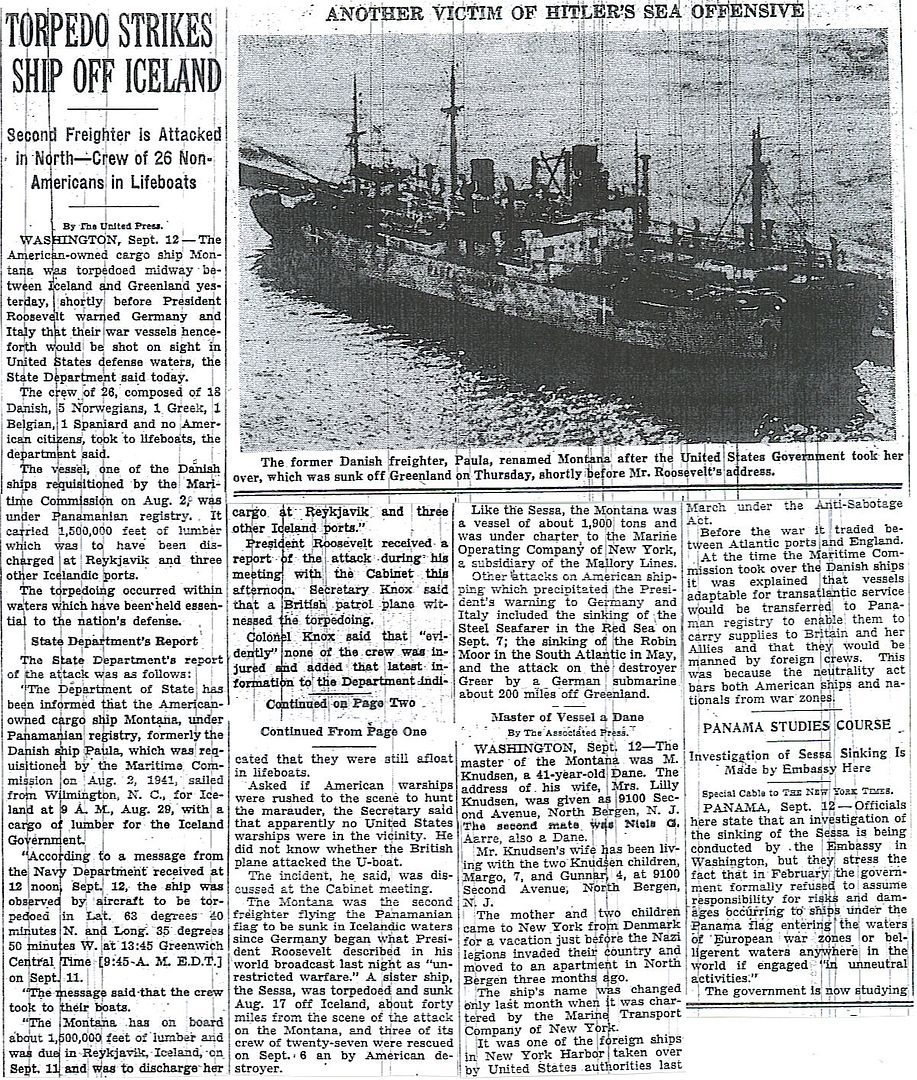
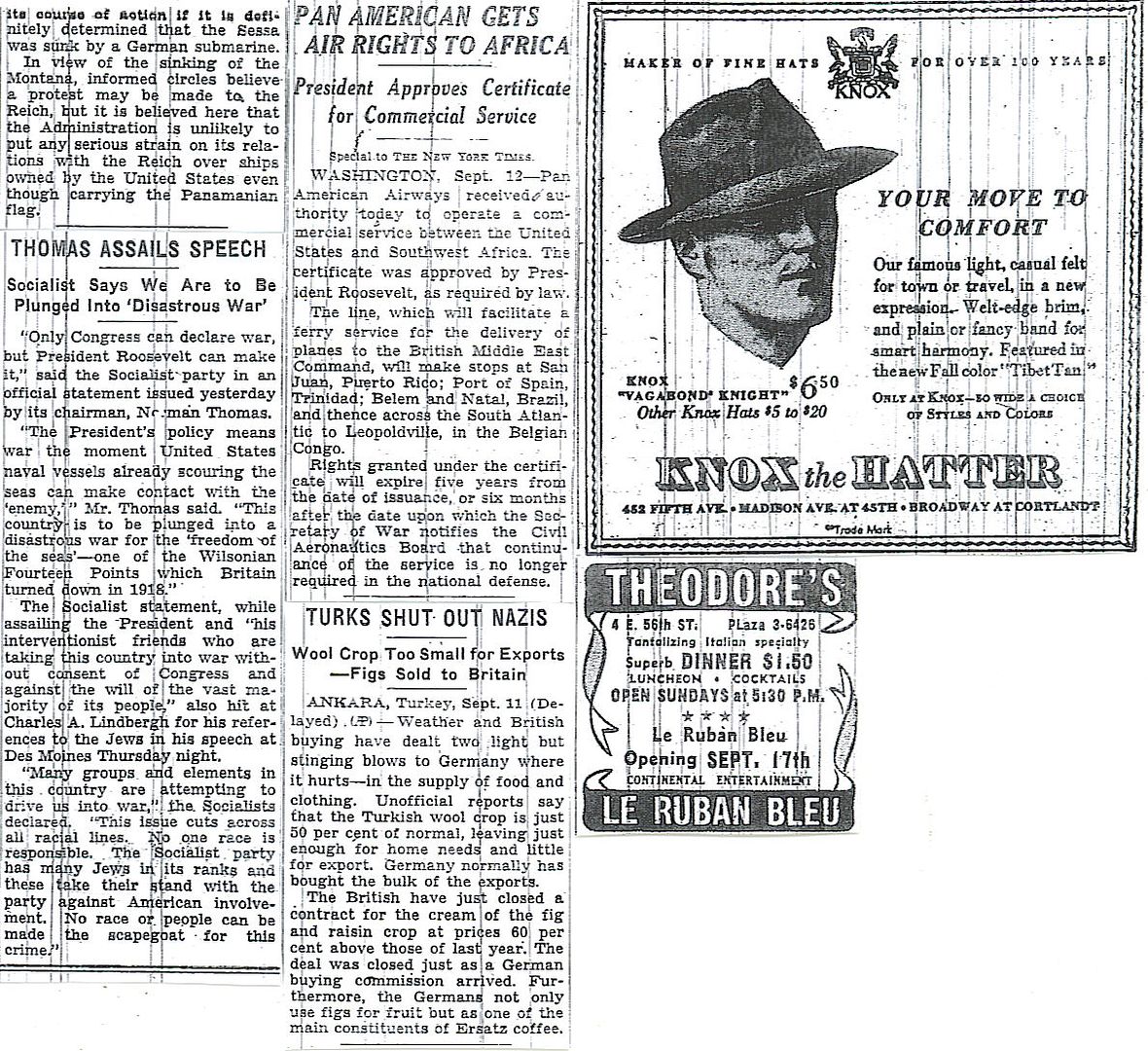
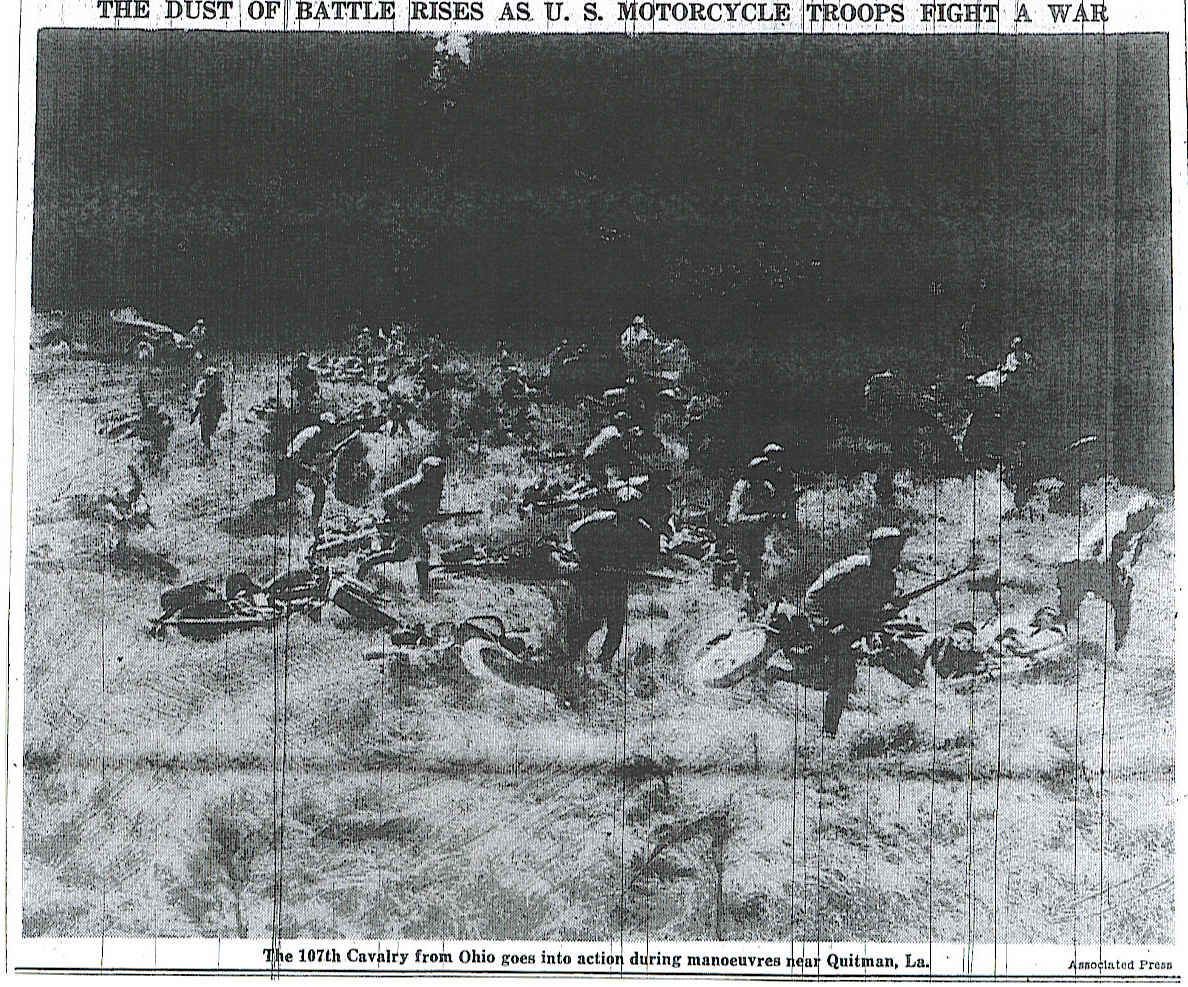
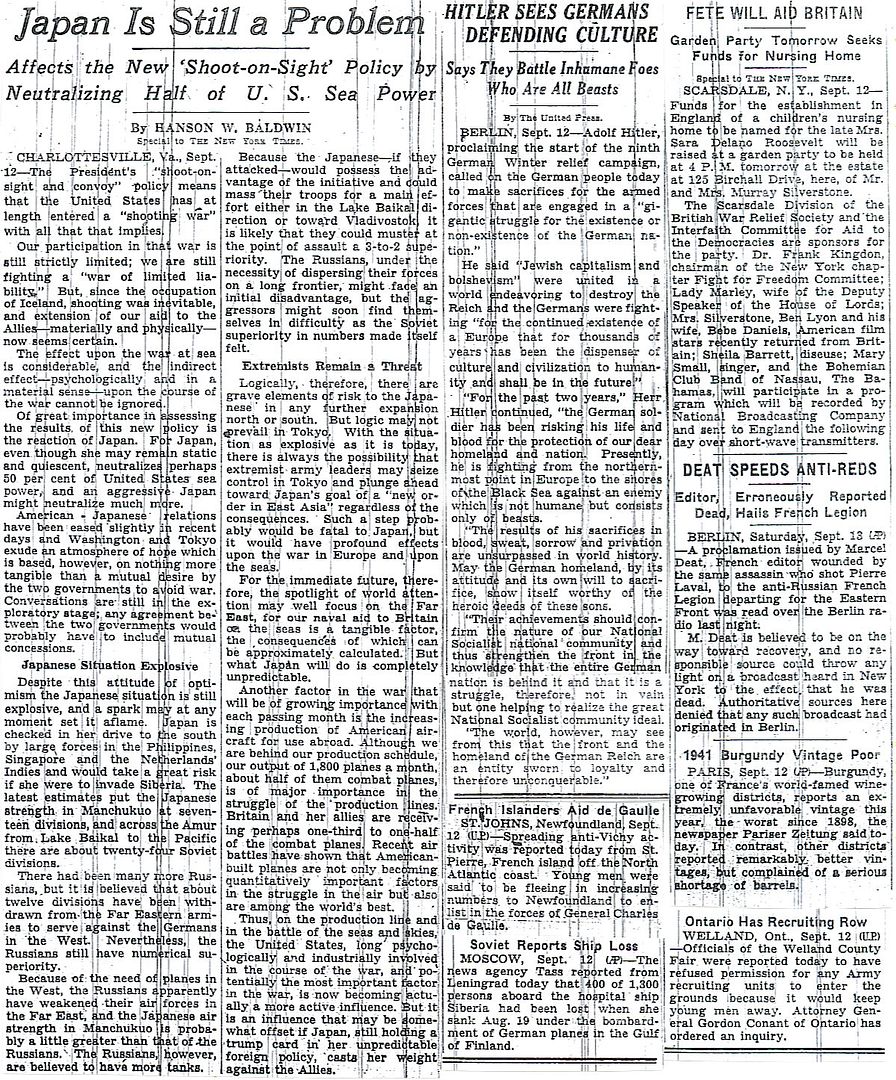
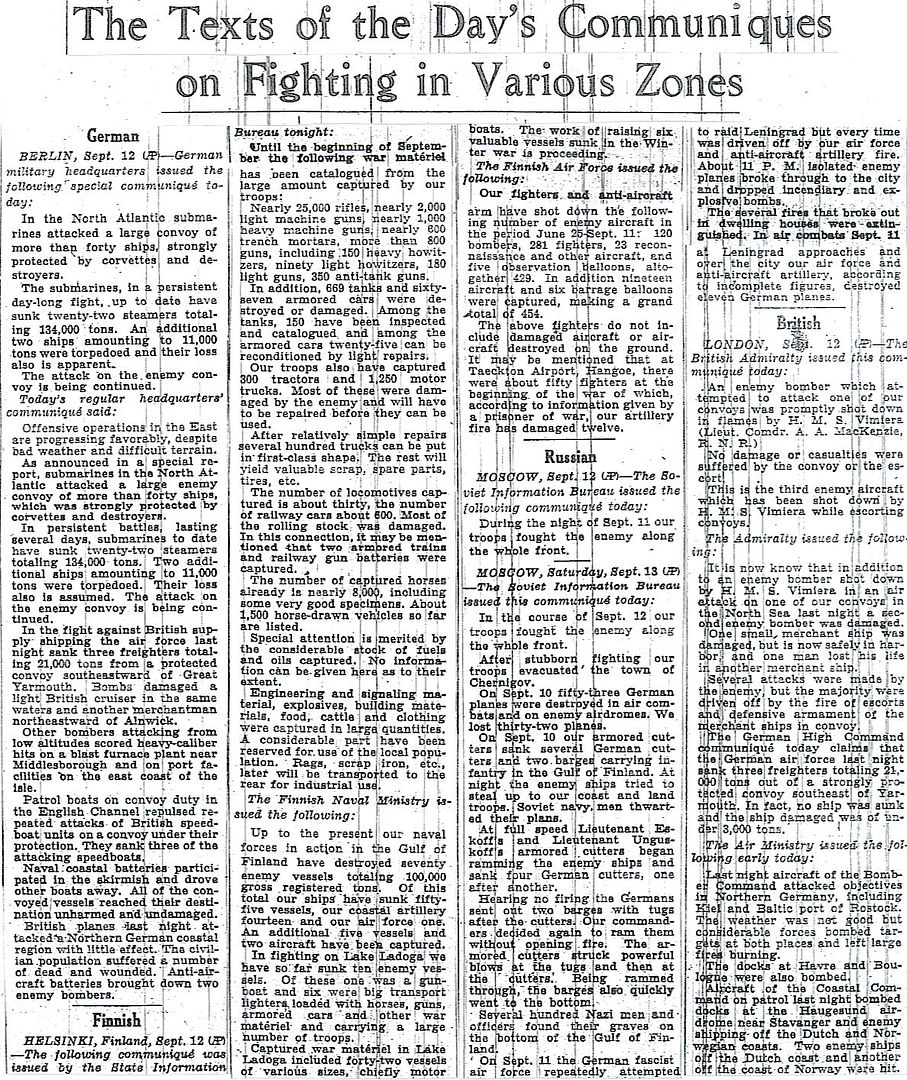
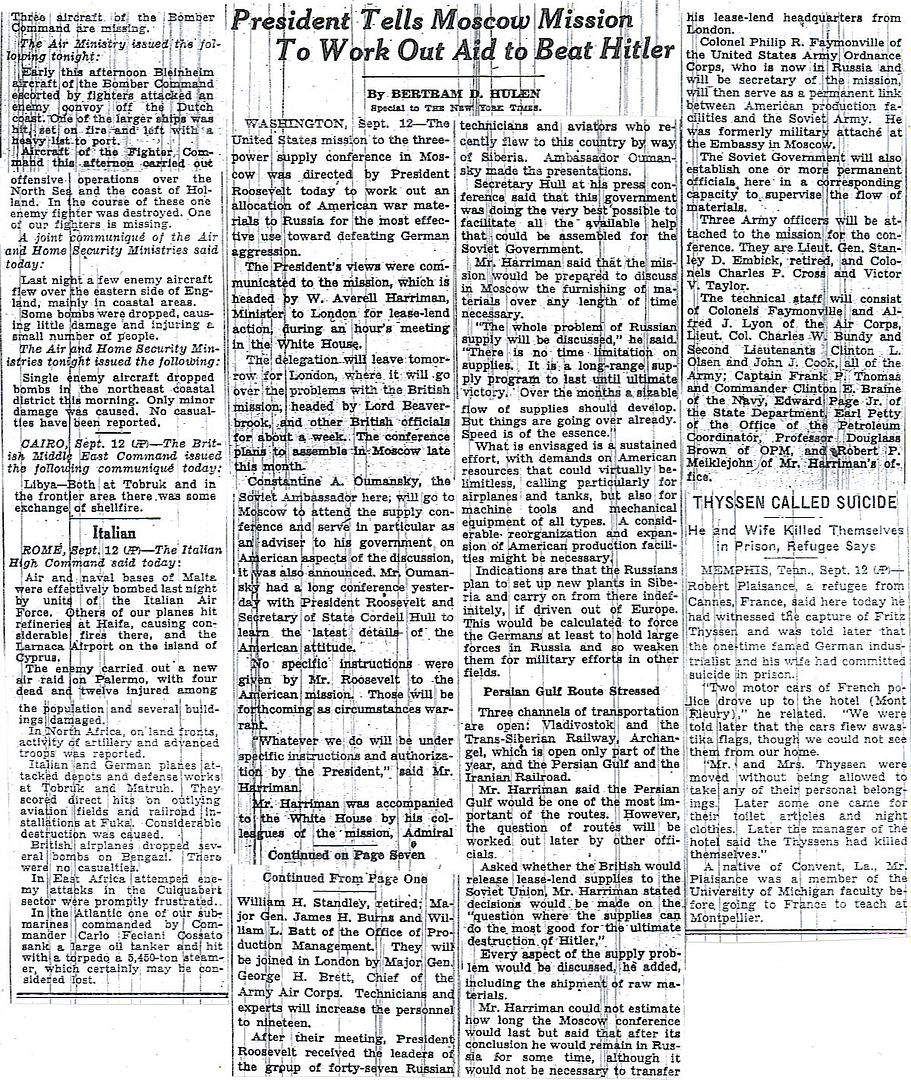
#1 – “Green Eyes” - Jimmy Dorsey, with Bob Eberly and Helen O’Connell
#2 – “Yours” – Jimmy Dorsey, with Bob Eberly
#3 - “Blue Champagne” – Jimmy Dorsey, with Bob Eberly
#4 - “Yes Indeed!” - Tommy Dorsey, with Jo Stafford and Sy Oliver
#5 - “Maria Elena” - Jimmy Dorsey, with Bob Eberly
#6 - “You and I” - Bing Crosby
#7 - “Daddy” - Sammy Kaye, with the Kaye Choir
#8 - “Piano Concerto in B Flat” (“Tonight we Love”) - Freddy Martin, with Jack Fina
#9 - “Chattanooga Choo Choo” - Glenn Miller, with Tex Beneke and the Modernaires
#10 - “Til Reveille” – Bing Crosby
http://www.onwar.com/chrono/1941/sep41/f13sep41.htm
Japanese navy completes exercise
Saturday, September 13, 1941 www.onwar.com
In the Pacific... The Japanese Combined Fleet completes a 4-day exercise.
Lindbergh threatening the Jews in Des Moines on September 11 1941:
No person with a sense of the dignity of mankind can condone the persecution of the Jewish race in Germany. But no person of honesty and vision can look on their pro-war policy here today without seeing the dangers involved in such a policy both for us and for them. Instead of agitating for war, the Jewish groups in this country should be opposing it in every possible way for they will be among the first to feel its consequences.
Tolerance is a virtue that depends upon peace and strength. History shows that it cannot survive war and devastations. A few far-sighted Jewish people realize this and stand opposed to intervention. But the majority still do not.
Their greatest danger to this country lies in their large ownership and influence in our motion pictures, our press, our radio and our government.
I am not attacking either the Jewish or the British people. Both races, I admire. But I am saying that the leaders of both the British and the Jewish races, for reasons which are as understandable from their viewpoint as they are inadvisable from ours, for reasons which are not American, wish to involve us in the war.
We cannot blame them for looking out for what they believe to be their own interests, but we also must look out for ours. We cannot allow the natural passions and prejudices of other peoples to lead our country to destruction.
The Soviet High Command was appalled at the defeat at Schlüsselburg.
With every means in his power Marshal Voroshilov tried to regain this important keypoint for his eastward communications. He drove entire regiments in assault boats and landing craft across the lake from the western shore against the Schlüsselburg side. Simultaneously he ordered an attack from the landward side, from Lipki.
Colonel Hoppe's regiment was cut off at times. The Russians were bringing up more and more forces. On the German sides the troops began to suspect that heavy casualties lay in store for them. And some also began to suspect that Leningrad's encirclement from the east would become illusory once Lake Ladoga froze over in winter.
The optimists laughed at such misgivings.
" Winter?" they asked. " Leningrad will have fallen long before the first frost."
But Leningrad did not fall. Why not?
Because Hitler and the Wehrmacht High Command had decided not to take Leningrad before the winter, but merely to encircle it and starve it out. Paradoxical as it sounds, this is exactly what happened. At the very moment when Leningrad's last line of defense had been broken, when the Duderhof Hills had been stormed, when Uritsk and Schlüsselburg had been taken, and the city, shaking with fright, lay right in front of the German formations, came the red light from the Fuehrer's headquarters.
General Reinhardt, commanding XLI Panzer Corps —later promoted Colonel-General—recalls the situation:
"In the middle of the troops' justified victory celebrations, like a cold shower, came the news from Panzer Group on 12th September that Leningrad was not to be taken, but merely sealed off. The offensive was to be continued only as far as the Pushkin-Peterhof road. The XLI Panzer Corps was to be detached during the next few days for employment elsewhere. We just could not understand it. At the last moment the troops, who had been giving of their best, were robbed of the crown of victory."
Sergeant Fritsch merely tapped his forehead when the commander of 2nd Company Panzer Battalion 37 said to him, " We are not allowed into Leningrad. We are being pulled out of the line. I got it from a wireless operator at divisional headquarters."
" You're nuts," Fritsch said, corroborating his gesture.
The rumor of the decision had leaked also to 1st Panzer Regiment, 1st Panzer Division. But the officers merely shook their heads.
" It's just not possible. Surely we didn't come all the way from East Prussia to the gates of Leningrad merely to walk away now as though it had all been a mistake?"
Everybody was grumbling and every conversation ended with the words: " Surely, it's not possible."
The order of Army Group was still being kept secret because Leningrad was to be surrounded as closely as possible and a number of important points on the outskirts were yet to be captured—as, for instance, Kolpino and the heights of Pulkovo. But what unit would fight with any enthusiasm if its men knew that all they were after was front-line rectifications, while the great objective was no longer to be attempted? The troops, therefore, were allowed to believe that the capture of Leningrad was the objective, and so they fought with the utmost vigor.
This is shown very clearly by the following account from the diary of Second Lieutenant Stoves, commanding No. 1 Platoon, 6th Company, 1st Panzer Regiment: On 13th September three Soviet heavy KV-1 and KV-2 tanks, fresh from the Kolpino tank factory, partly without their paintwork, came rumbling down the road from Pulkovo through the morning mist, heading for the intersection with the Pushkin-Krasnoye Selo road.
Stoves gave the action stations signal to his three tanks standing along both sides of the road to the airfield of Pushkin, ordered his own tank-driver to move behind a shed and keep his engine running, and to provide cover towards the south. He then inspected the pickets outside the village of Malaya Kabosi, together with Captain von Berckefeldt.
Thick eddies of morning mist were contending with the sun. The time was 0700 hours. Sergeant Bunzel's tank, No. 612, slowly moved on to the road.
Suddenly, as if they had sprung from the ground, two enormous KV-2s stood in front of them.
Stoves and Berckefeldt flung themselves into the roadside ditch. But at that moment came a crash. Bunzel had been on the alert. Once more his 5-cm. tank cannon barked. The leading Soviet tank stopped. Smoke began to issue from it.
The second moved forward past it.
This one was hit by Sergeant Gulich, whose tank, No. 614, stood on the far side of the road. The very first shell scored a direct hit. The crew of the KV-2 baled out.
Five more KV-2 monsters appeared. And out of the mist near Malaya Kabosi came three KV-1 s heading straight for Sergeant Oehrlein's tank, No. 613, Russian infantry, who had been riding on top, jumped down and advanced in line abreast.
The leading KV fired its 15.cm. gun.
Direct hit on Oehrlein's tank. The sergeant was slumped over the edge of his turret, seriously wounded. Stoves ran across. Right and left of him Soviet infantry were charging. The German pickets around Malaya Kabosi were withdrawing.
In the mist it was almost impossible to tell friend from foe.
Together with Oehrlein's gun-layer, Stoves first of all dragged the driver, the most seriously wounded man, over to Sergeant Gulich's tank, which was standing behind a small shed, giving covering fire with its machine-gun. Then they ran back again. They lifted Sergeant Oehrlein out of the turret. They also tried to get the badly wounded radio operator out, but this proved impossible. They could not get to him. Out of the mist, like specters, came the Russians.
Urra! Second Lieutenant Stoves quickly secured all hatches with the square-shanked key.
They would get the radio operator out when they made their counter-attack later. Until then the Russians had better be kept out of the tank.
At that moment the gun-layer cried out in pain. He had been hit in the arm.
"Come on, man, run," the lieutenant shouted at him. The gun-layer, a medical student, held his damaged arm with his other hand and raced off into the mist. Stoves got the unconscious Oehrlein on to his shoulder and hurried away with him. Right and left Soviet infantrymen were charging past with fixed bayonets.
Evidently they regarded the Panzer lieutenant as one of their own men—probably because of the padded Russian jacket he was wearing. Stoves managed it. He reached his tank, which was still providing cover against the west, well camouflaged behind the shed. A Medical Corps armed infantry carrier arrived, took charge of Oehrlein, the driver, and also the gun-layer, and drove off again. The scene was still shrouded in swirling mist —it was like a witch's cauldron.
The 1st Company, 113th Rifle Regiment, meanwhile had suffered something very like an attack of panic. It withdrew from the Malaya Kabosi crossroads. The infantry guns had long left the spot, and so had the anti-tank gun.
Twenty-five yards from the shed a KV-1 crawled past Second Lieutenant Stoves's tank, No. 611. It exposed its broadside.
Get him! Lance corporal Bergener, the gun-layer, got him. A second shell put the next Russian out of action. Stoves's tank was excellently camouflaged. Now it crept cautiously to the corner of the wooden shed. A third and fourth KV were coming down the road. Their commanders were nervous and uncertain where the deadly fire was coming from.
Bergener was lying in wait. "Fire!"
Too short.
"Again!" The second shell hit the Russian straight on the gunshield. The fourth tank, which hurriedly tried to turn about, received a hit astern. At that moment Stoves saw Sergeant Bunzel's tank falling back, pursued by a KV. Bunzel could not fire at him: his gun had received a hit. Stoves's gun-layer, Bergener, saved Bunzel. He shot up his pursuer. It was the fifth Soviet tank put out of action that day.
By now the Russians had located the dangerous German.
Anti-tank rifles were cracking; crash-boom shells were bursting close to the shed. "We're leaving!" Stoves commanded.
In a small spinney they met Bunzel's tank, No. 612. He reported: "Cannon damaged, but both m.g.s in order."
Thirty yards farther back was Gulich's tank, No. 614— somewhat the worse for wear. At the edge of a ditch near by a machine-gun party was in position. Stoves skipped across to them. He found Captain von Berckefeldt, his steel helmet askew on his head.
"A fine mess," he observed drily. "To start with, my men skedaddled because of the heavy tanks. But my lieutenant is just rounding them up again. We'll be on the move again in a minute."
Stoves returned to his tank. The engine came to life with a whine. Cautiously they drove back to the crossroads, to Oehrlein's tank, to get the radio operator out.
Twenty minutes later First Lieutenant Darius, commanding the 6th Panzer Company, caught his breath sharply.
Over the air came the hoarse voice of Stoves's radio operator: "Second Lieutenant Stoves has just been killed when our tank was hit."
What had happened? A KV-1 had scored a direct hit on the super-structure of tank No. 611 at a range of 400 yards. The splinters had torn open the lieutenant's head and face. Covered with blood, he had collapsed in the commander's seat.
But death had not claimed him yet. Five weeks later the lieutenant was back with his regiment. But by then it was no longer outside Leningrad.
The 1st Panzer Division went on to take the suburb of Aleksandrovka, the terminus of the Leningrad tramway's southwestern line, seven and a half miles from the city centre.
Then, on 17th September, the Panzer Corps was withdrawn from the front—"for employment elsewhere." It was to be employed at Moscow.
The force before Leningrad had thus been deprived of its mailed fist. Although the great objective seemed within arm's reach, the infantry divisions nevertheless came to a standstill —96th and 121st Infantry Divisions in front of the legendary Pulkovo hills, where in the civil war of 1919 the White regiments had similarly been halted in their attempts to recapture Red Leningrad.
The combat-hardened 58th Infantry Division was in Uritsk, shelling targets in the centre of Leningrad with its medium artillery. The men in their trenches along the coastal road could see the smoking chimney-stacks of the Leningrad factories only four miles away. The industrial plants and shipyards were working round the clock, producing armaments— tanks, assault boats, and shells. Thirty Soviet divisions were herded together inside the city. But they were not through yet. Though quite ready now to put an end to the fighting, they were being granted a respite and time to get over their panic.
It was incredible. What was behind this incomprehensible decision?
The plan for Operation Barbarossa stipulated clearly: Following the destruction of the Soviet forces in the Minsk-Smolensk area the Panzer forces of Army Group Centre will turn to the north, where, in cooperation with Army Group North, they will destroy the Soviet forces in the Baltic areas and then take Leningrad.
The directive said quite clearly: Only after the capture of Leningrad is the attack on Moscow to be continued.
This plan, strategically speaking, was entirely correct and logical, especially in its pin-pointing of the centre of gravity of the campaign, and in its intention of making the Baltic available as a supply route as soon as possible and of accomplishing a link-up with the Finns. Disregarding this clear plan, Hitler changed his mind after the fall of Smolensk. Why?
The Army High Command and the generals in the field were urging him to take advantage of the unexpectedly rapid collapse of the Soviet Central Front and to capture Moscow, the heart, brain, and transport centre of the Soviet Union. But Hitler was reluctant.
For six weeks the tug-of-war continued and precious time was lost. In the end Hitler neither stuck to his plan of taking Leningrad first nor gave the green light for the attack on Moscow. Instead, on 21st August 1941, he chose an entirely new objective—the oil of the Caucasus and the grain of the Ukraine. He ordered Guderian's Panzer group to drive 280 miles to the south and, jointly with Rundstedt, to fight the battle of Kiev.
That battle was won. Indeed, it was a tremendous victory, with over 665,000 prisoners and the annihilation of the bulk of the Russian forces on the Soviet Southern Front.
This victory in the Ukraine misled Hitler into assuming that the Soviet Union was on the verge of military collapse— an error which led him into further disastrous decisions.
At the beginning of September he ordered the German armies in the East to attack Moscow after all—in spite of the advanced season—and to capture it. At the same time the offensive was to be continued in the south against the Caucasian oilfields and the Crimea. Leningrad, on the other hand, was to be encircled and starved into surrender.
Since the sealing-off of Leningrad required no armored forces, and since, on the other hand, the attack on Moscow had to be mounted quickly in view of the approaching winter, Hitler on 17th September withdrew Hoepner's Panzer Group and all bomber formations from the Leningrad front. This order came at the very moment when one last effort would have meant the capture of the city.
Whatever the reasons, Hitler's decision not to take a city strategically and economically as important as Leningrad was a crime against the laws of warfare.
This crime was to be heavily paid for later.
From a military point of view the fall of Leningrad and the Oranienbaum [Now called Lomonosov.] pocket would have meant the disarming of nearly forty Soviet divisions. Equally important would have been Leningrad's elimination as an armaments centre. The city's tank factories, as well as its ordnance and ammunition plants, continued to turn out their products undisturbed right through the war, and to supply the Red Army with vital armaments. The fall of Leningrad, moreover, would have freed the German Eighteenth Army for other operations, whereas it was now condemned to guard duty outside Leningrad until 1944.
Finally, Leningrad would have been of inestimable value as a supply base for the German Eastern Front.
Unimpeded by partisans, supplies could have been routed through the Baltic. The link-up with the Finns, moreover, would have given a different turn to the fighting in the Far North, for Petrozavodsk and for the allied supply base of Murmansk, where no progress was being made at all for the simple reason that the available forces were insufficient.
But by far the most serious error of the German Command lay in the fact that Leningrad was encircled in the summer only.
The big natural obstacles, such as lakes, river courses, and marshes, which during the summer were as good as actual parts of the German siege forces, became excellent lines of communication and huge gaps in the encircling ring in winter, the moment Lake Ladoga and the Neva froze over. Through these gaps supplies and reinforcements could be brought in right through the winter months.
Moreover, towards the east, Leningrad still had a 50-mile-wide corridor all the way to Lake Ladoga so long as the Finns did not cross their old frontier in the Karelian Isthmus. As a result, Zhdanov, the Defense Commissar, was able to build the "Road of Life" over the ice of Lake Ladoga—including a motor highway and a railway branch line connecting with the Murmansk railway. Along this lifeline on ice the city was being supplied from the lake's eastern bank. Suddenly Leningrad was no longer sealed off: the German encirclement had been breached by "General Frost."
In order to close this wintertime gap, Army Group North mounted its extensive Tikhvin operation.
This aimed at including Lake Ladoga in the siege front and sealing off Leningrad east of the lake. The Finns were to drive across the Svir from the north and to link up with the German Sixteenth Army east of the lake. The XXXIX Panzer Corps under General Rudolf Schmidt was to use four mobile divisions for a thrust into the almost pathless northern Russian taiga which the German Military-Geographical Records described as "virtually uncharted."
On 15th October the Corps with 12th and 8th Panzer Divisions, as well as 18th and 20th Motorized Infantry Divisions, moved off from the Volkhov bridgeheads of 126th and 21st Infantry Divisions, crossing the big river to the east. Its first objective was Tikhvin.
There the last rail connection from Vologda to Leningrad was to be cut and the advance continued as far as the Svir, where the link-up was to be effected with the Finns. That link-up would have completed the encirclement of Leningrad, including Lake Ladoga.
In the evening of 8th November the Pomeranians and Silesians of 12th Panzer Division and 18th Motorized Infantry Division entered Tikhvin after stiff and costly fighting.
The two divisions organized themselves for defense—General Harpe's 12th Panzer Division west of the town and General Herrlein's 18th Motorized Infantry Division east of the town.
The 18th thus represented the extreme north-eastern corner of the German front in Russia.
The first part of the operation had gone so smoothly, thanks to the employment of experienced regiments, that the Fuehrer's headquarters quite seriously asked Corps whether a drive to Vologda —i.e., another 250 miles farther east —would be possible.
Two hundred and fifty miles—in winter!
Major Nolle, the chief of operations of 18th Motorized Infantry Division, spoke his mind very bluntly when the question was put to him by his Corps commander.
How Utopian such an idea was was shown only two days later.
The morning of 15th November brought the expected fullscale attack by a fresh Siberian division, supported by an armored brigade with brand-new T-34s.
The day began with a hurricane of fire from the very latest type of "Stalin's organ-pipes." It was a savage battle. The batteries of 18th Artillery Regiment under Colonel Berger destroyed fifty enemy tanks. For several days the Siberian rifle battalions charged against the German front line—until they were bled white.
Tikhvin, though but a smouldering heap of ruins, remained in German hands.
Naturally the Soviet High Command realized that the bold German Panzer operation was aiming at a link-up with the Finns on the Svir. Stalin therefore flung further Siberian divisions into the path of the Panzer Corps. Highly critical situations arose in the area of 61st Infantry Division, which was in danger of being surrounded, and stiff fighting consumed the combat strength of the Corps.
All their courage was in vain.
Even the hardy Finns, familiar as they were with the climate of the North Russian taiga in winter, did not succeed in crossing the Svir. The XXXIX Panzer Corps was on its own.
In desert country, in the face of unceasing attacks by Siberian operational reserves, the Corps was unable to maintain its exposed positions.
General von Arnim, Schmidt's successor, therefore again withdrew his divisions to the Volkhov.
The feats of the rearguard battalions covering this retreat were unparalleled.
Colonel Nolle—then Major Nolle and chief of operations of 18th Motorized Infantry Division— remarked: "Not many men make good vanguard commanders. But to command a vanguard is an easy matter compared with commanding a rearguard.
The vanguard commander is backing success—the rearguard commander covers up for a failure.
The former is swept ahead by the enthusiasm of thousands, the latter is weighed down by the misery and sufferings of the defeated."
In terms of military discipline and courage, the retreat from Tikhvin to the Volkhov, according to Colonel-General Halder, marked a glorious page in the history of soldierly virtue. An outstanding example was 11th and 12th Companies, 51st Infantry Regiment, under Lieutenant-Colonel Grosser, who literally sacrificed themselves—who allowed themselves to be shot, bayoneted, and battered to death in order to cover the retreat of their comrades.
When the spent remnants of XXXIX Panzer Corps were brought back across the Volkhov on 22nd December 1941, in 52 degrees below zero Centigrade, they had behind them an appalling experience.
The Silesian 18th Motorized Infantry Division alone had lost 9000 men. Its combat strength was down to 741. These few made their way back over the Volkhov. The Tikhvin operation, the great encirclement of Leningrad, had failed.
The fate of 3rd Battalion, 30th Motorized Infantry Regiment, demonstrates how the fighting for Tikhvin surpassed the capabilities of the units involved.
On its march from Chudovo to Tikhvin, when the temperature suddenly dropped to 40 degrees below zero, the battalion lost 250 men—half its combal strength—most of them through being frozen to death.
In the case of some of them the frightful discovery was made that their cerebral fluid had frozen solid because they had not worn any woolen protection under their steel helmets.
From then onward the front between Leningrad and Volkhov was to be a permanent source of danger and costly fighting for the German forces in the East.
It was the penalty for having gambled away the capture of Leningrad, the penalty for trying to do too much in too many different places.
As it was, Hitler had not reached his operational objectives for 1941 either in the North or on the Central Front: Leningrad and Moscow remained unsubdued.
Hitler Moves East by Paul Carell
I don't have the full article from page 1. Cougar posted the audio of the speech on 9/11 (reply #14). There will be a number of unfavorable responses appearing in the next few days,including an article titled "Dewey Denounces Lindberg's Talk," on Thursday.
The Andrew Etherington posts are now posted for 9/11 and 9/12 also, if anyone wants to go back and read them.
http://homepage.ntlworld.com/andrew.etherington/month/thismonth/13.htm
September 13th, 1941
GERMANY: The food shortage is beginning to bite in the Third Reich. In a report soon to be issued by the ministry for food and nutrition, Germans will be urged to be more economical in the way that they eat potatoes.
“In every household in Germany, potatoes should now only be served in their skins,” it says. “It is most important that in canteens and restaurants, potato peelers are not used.”
U-378, U-459 and U-460 launched. (Dave Shirlaw)
BALTIC SEA: The Finnish ‘armoured ship’ ILMARINEN hits a mine and sinks while on a deception manoeuvre to draw Russian attention from the invasions of the islands of Hiidenmaa and Saarenmaa (two large islands off the western coast of Estonia). They were to sail with other ships as conspicuously as possible for a while and then turn back. ‘Ilmarinen’ sank just when they were about to turn. 132 men are saved but 271 die, making it Finland’s worse maritime disaster. (Mikko Härmeinen)
U.S.S.R.: German forces under Kleist and Guderian link near Lokhvitsa. This cuts the pocket of 600,000 soviet soldiers east of Kiev. Chernigov on the Desna is evacuated under German attacks.
The Russian, General Winter, arrives on the Eastern Front with the first snowfall of the season being reported.
CANADA: Corvette HMCS Drumheller commissioned.
Corvettes HMCS Levis and Mayflower departed St John’s as escort for the 54-ship Sydney to Liverpool Convoy SC-44.
Minesweepers HMCS Malpeque and Minas depart Esquimalt for Halifax. (Dave Shirlaw)

German infantry patrol from Grossdeutschland moving into the forest on a hunt for snipers/partisans-Central Front-July 1941
German medic takes care of soldier who has just been wounded.Potschlowaj, Ukraine-August 1941
Soviet Union, Zhitomir .- Adolf Hitler and Walter von Reichenau at the headquarters of the 6th army during Hitler's visit to the Eastern front in 1941
German soldier wounded in the forest of Augustow -being prepared to be taken to a dressing station. June 22, 1941
Army Group North-Waffen SS Totenkopf Division stops for maintenance in the Baltics-summer 1941
General Walter Hoernlein greets new recruits at the "Grossdeutschland" training camp in Achtyrka in the Ukraine. Many are voluntary transfers from supply services who were more than happy to join such a famous and honored division-Spring 1943
Soviet Union-Army Group Center .- Brigadier Borislav Kaminski, commander of the infamous "Kaminski Brigade" (3rd from left) in consultation with German police officers on the use of its own national federation (RONA) against Soviet partisans-probably 1943-44
Army Group Center- Soviet Union .- meeting of officers, from left Field Marshal Fedor von Bock, Colonel Walther von Hünsdorff (hidden), Colonel General Hermann Hoth, Wolfram von Richthofen July 1941
Soviet Union's Army Group Center- 4 Panzer Army. Richard Ruoff and his (chief of staff?) Rottiger in conversation with a wounded soldier of the Signal Corps in snowy landscape near Moscow-Nov 1941
Army Group North-Panzer 38(t)enter a pine grove near Leningrad-Oct 1941
Soviet Union .- ambulance truck and motorcycle riders (motorcycle with sidecar) on typical Russian dirt road-Summer 1941
Russia-Army Group North captured French Renault R-35 tanks with German license plates (tower number 3) and dispatch rider with a sidecar on muddy forest paths; Summer 1941
Supply drivers and mobile troops "unofficially" drain fuel from captured railroad tank cars-June-July 1941
On the Soviet front:the French Legion East member. M. Léon, 15 years old, the youngest soldier in the legion. He was born in Tbilisi-Dec 1941
Central Russia soldiers of the Légion des Volontaires Français contre le bolchévisme (LVF, 638th Infantry Regiment) presenting the troop flag (tricolor with the inscription "Légion des Volontaires")Nov 1941
Central Russia Nov 1941 soldiers of the Légion des Volontaires Français contre le bolchévisme (LVF, 638th Infantry Regiment), present the flag to Field Marshal Hans Günther von Kluge
Good photo of roadside conditions in Army Group Center during the fighting for Moscow Oct-Nov 1941
After crossing the Dnieper, soldiers from an infantry company set up new positions and fox holes with machine-guns in an open field. The new position covers all the ground up to the grove in the distance. They are on the lookout for Soviet stragglers from Kiev-Sept 1941
Try to put this in the context of the bigger picture.
Leningrad is for all intents isolated.
East Front losses are running far higher than predictions, in both manpower and equipment. Supply caches are dwindling, and the primary concern of Hitler is fast becoming oil to keep the machines of war fueled.
Soviet opposition in the South, especially around Kiev, is MUCH stiffer than anticipated, and far more fanatical. The High Command and German Intelligence have severely underestimated Soviet Forces available in the Ukraine and Southern Russia.
And the timetable, already delayed by Yugoslavia, is slipping, especially in the south.
"Distraught and terrified, these Jewish women struggle to recover from a severe beating at the hands of Romanians and/or Germans.
This violence was the first in a wave of persecution unleashed against the Jews of Bessarabia, Romania.
It was followed by deportation and death marches to camps in Transnistria, Romania.
Many did not survive the cruel journey, falling victim to shootings, hunger, and thirst.
Thousands perished by drowning in the Dniester River."
Disclaimer: Opinions posted on Free Republic are those of the individual posters and do not necessarily represent the opinion of Free Republic or its management. All materials posted herein are protected by copyright law and the exemption for fair use of copyrighted works.